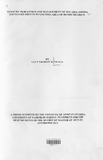| dc.description.abstract | The control of malaria remains one of the greatest public health challenges, particularly, as we are still waiting for an efficacious and applicable vaccine. Current statistics show that over one million deaths (mostly in children) occur each year with another over 200 million being exposed to infective bites. Notably, 90% of the world's malaria burden is found in sub-Saharan Africa. Over 75% of malaria mortality is experienced among children aged 0-4 years. Consequently, Plasmodium falcipurum is one of the most significant pathogens encountered by the African child.
This study set out to investigate the perceptions of malaria among mothers of young children in Nyang' oma and how these perceptions influenced the ways in which malaria is managed by these mothers. In regard to management of malaria, the study sought to establish the treatment options employed by the mothers to cure malaria in their children.
Data collection was carried out using a combination of qualitative and quantitative techniques. Qualitative methods included Focus Group Discussions (FGDs), in-depth open-ended interviews, direct observation, narratives, key informant interviews and use of secondary data. Quantitative method involved use of a standardised survey questionnaire.
Malaria means various illnesses and diseases for the mothers in Nyang'oma. This conclusion came up as a result of respondents describing malaria in terms such as "strong
malaria", "malaria of meningitis", "malaria of typhoid" and "malaria". Symptoms given
for various "malarias" also differed with some agreeing with what is biomedically recognized as malaria and most being a mixture of symptoms of what is biomedically defined as malaria and other diseases. Malariawas generally said to be just "malaria" or "strong malaria". What was described as "malaria" was illness with fever and usually
accompanied by headache, vomiting and loss of appetite whereas "strong malaria" had
other symptoms in addition to those of "malaria". These symptoms include fainting and
"madness".
Agents perceived to cause malaria are varied and diverse. Causes of malaria varied from human, supernatural, to natural. A large proportion of the respondents attributed malaria to the mosquito in addition to other agents mentioned above. Causes of strong malaria were mostly associated with supernatural forces (ancestors, evil spirits - "nyawawa" and god), a worm in the head and witchcraft.
Various management strategies were employed to counter perceived malaria. These involved the use of biomedical or ethnomedical resources or a combination of both. Biomedical remedies employed involve the use of over- the- counter drugs (OTCDs), injectionists or modem health facilities. Ethnomedical resources include use of herbs, preparations, charms or magico-religious rituals.
A number of factors affect the management strategies employed to counter malaria.
These factors include the cost of treatment, distance to health facilities, availability of transport means, religion, intrahousehold gender relations and perceived cause, symptoms and severity of the disease.
Following the findings, the following recommendations are made and will help in addressing various issues to improve various aspects regarding malaria. The recommendations are: the need for health education (which pays special attention to the participation of mothers of young children) on malaria touching on causes, prevention, symptoms, the adverse effects and proper treatment. There is also need for scientific studies on the herbs used for treatment and prevention of malaria so that their safety and efficacy can be established. More health facilities are needed in Nyang'oma since the two existing ones are insufficient, in addition to one of them being unaffordable for the residents ofNyang'oma. | en |

